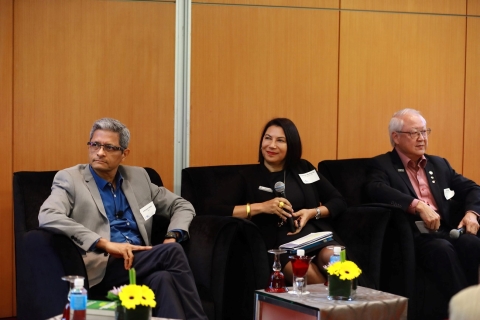PCMA-ICESAP Knowledge Exchange Lands in Kuala Lumpur

The Kuala Lumpur Convention Centre (the Centre) recently hosted the PCMA-ICESAP Knowledge Exchange Kuala Lumpur.
The engaging educational programme was short and punchy, and brought together over 30 leading business events industry players, stakeholders and decision-makers to share knowledge and experience on how they are recalibrating their businesses in response to constant digital, political and economic change.
PCMA-ICESAP Regional Business Director-APAC, Antonio Codinach, said, “This was our first knowledge exchange event in Malaysia, which made us all pioneers! Being relatively new to the industry, I have noticed we are very good at talking amongst ourselves, so I am making it my mission to ‘open up’ the business events industry, which was one of the purposes of this session.”
He added, “Our industry (business events) makes a tremendous contribution to key educational and economic sectors, and this event provided us with a platform to debate, interact and share ideas on how we can evolve together and drive this important industry forward.”
Under the overarching theme ‘Evolving Your Business Model For Changing Times’, keynote speaker, CEO Co-Founder of SigMax-e Services and co-author of ‘9 Entrepreneurisms’, Srikrishna Vadrevu, posed two questions to participants, “What is changing? What is not?”
The general consensus is that, “Basically, everything is changing, but one thing that remains constant is that the customer is king and that a good way to navigate the changing landscape is to run your business with an ‘entrepreneurial attitude’ and not assume you know what consumers want.
Definitions are breaking down and people don’t care about categorisation. They want you to deliver the objective they have in mind by any means necessary.” He went on to describe the key entrepreneurship principles, such as passion, innovation, opportunism and learning, which can help drive businesses forward.
The keynote was followed by an interactive industry panel discussing and debating ideas on topics such as, education, talent development and the new age workforce, the importance of accreditation and the opening up the business events industry. Driving the panel discussion were the Centre’s Director of Sales and Marketing, Angeline van den Broecke; CEO of AOS Conventions & Events, Amos Wong and Srikrishna.
Angeline shared some key take outs relevant to the local context which included the need to go through an ‘unlearning’ process and change the language and terminologies used to help propel the industry forward.
Agreeing with Angeline, Srikrishna stated, “Unlearning is just as important as learning.”
Angeline continued, “It would be very beneficial to also connect more closely with the customer journey and experiential delivery. Ultimately we need to create a movement and engage more with those outside our industry sector to drive knowledge transfer and grow business opportunities.”
“It is critical that we can collectively and consistently demonstrate how business events drive expertise, business opportunities and knowledge exchange. The economic benefits of hosting important meetings and events can only multiply once the investment is made. This in turn, will elevate the country’s competitive advantage,” she added.


Add new comment